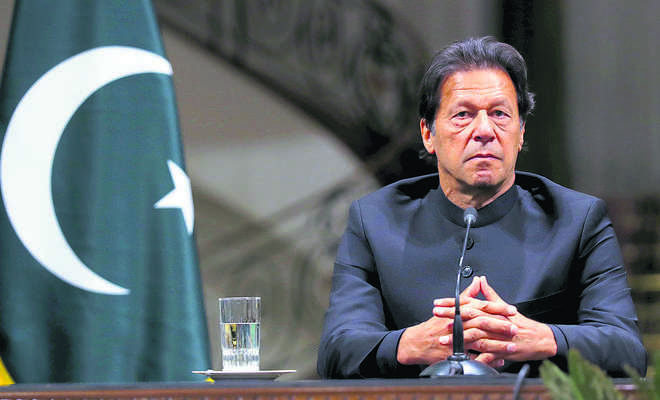Imran Khan claimed that America’s ungratefulness and a double standard international policy were to be blamed for Pakistan’s plight in his address to the United Nations General Assembly on Friday.
During a prerecorded speech reported by the US News, the Pakistani premier discussed topics including climate change, global Islamophobia, and “the plunder of the developing world by their corrupt elites.”
The cricketer-turned posh international celebrity turned politician called Prime Minister Narendra Modi’s Hindu nationalist government ‘fascist.’ But the politician painted both the United States and Pakistan as abandoners of their countries.
“For the current situation in Afghanistan, for some reason, Pakistan has been blamed for the turn of events, by politicians in the United States and some politicians in Europe,” Khan said. “From this platform, I want them all to know, the country that suffered the most, apart from Afghanistan, was Pakistan when we joined the U.S. war on terror after 9/11.”
Political Cartoons depicting World Leaders

After a brief introduction, he launched into a narrative in which the United States and Pakistan trained mujahedeen during the occupation of Afghanistan by the Soviet Union. The Soviets and Americans left Pakistan in 1989, leaving Pakistan to pick up the pieces.
Khan noted that the United States imposed sanctions on its former partner a year later, but then came calling again after the 9/11 attacks. Khan said Pakistan’s aid to the U.S. caused 80,000 Pakistani deaths as well as internal strife and dissent against the state while the U.S. conducted drone attacks.
“So, when we hear this at the end. There is a lot of worry in the U.S. about taking care of the interpreters and everyone who helped the U.S.,” he stated, pointing to Afghanistan. “What about us?”
According to Khan, Pakistan has received blame instead of a mere “word of appreciation.”
In spite of Khan’s rhetoric, many Afghans blame Pakistan for the Taliban’s resurgence in Afghanistan due to close ties between the two countries. Also in August, the United Nations denied Pakistan’s request to address a special session on Afghanistan, indicating that the international community shares Pakistan’s skepticism.
According to Khan, the international community should not isolate the Taliban, but instead, strengthen the current Afghan government for the sake of the people. His remarks echo those of his foreign minister, Shah Mehmood Qureshi, earlier this week on the sidelines at the U.N.
Taliban leaders, he said, were committed to human rights, and an inclusive government, and were not allowing terrorists to enter Afghan territory. Nevertheless, the Taliban has provided mixed messages to the country.
According to the Associated Press, Taliban hard-liners planned to carry out executions and amputate hands once again.
“If the world community incentivizes them, and encourages them to walk this talk, it will be a win-win situation for everyone,” he stated.
Khan reacted angrily to what he saw as an Indian free ride that was granted by that same community.
“It is unfortunate, very unfortunate, that the world’s approach to violations of human rights lacks even-handedness, and even is selective. Geopolitical considerations, or corporate interests, commercial interests often compel major powers to overlook the transgressions of their affiliated countries,” Khan stated.
Among the actions he cited were lynchings, pogroms and discriminatory citizenship laws, which he said had “unleashed a reign of fear and violence against India’s 200 million Muslim community.”
Khan continued to devote a great deal of time to Kashmir as he had done in the past.
“New Delhi has also embarked on what it ominously calls the ‘final solution’ for the Jammu and Kashmir dispute,” Khan said, rattling off a list of what he termed “gross and systematic violations of human rights” committed by Indian forces. He specifically decried the “forcible snatching of the mortal remains of the great Kashmiri leader, ” Syed Ali Geelani, who died earlier this month at 91.
Authorities buried Geelani’s body discreetly and without Geelani’s family’s consent, denying Kashmir’s revered separatist leader a proper Islamic burial. In his call to the General Assembly, Khan urged it to demand the proper burial and rites for Geelani.
The region of Kashmir is divided between India and Pakistan, which have been squabbling over its control since they gained independence from the British empire.
Despite Pakistan’s desire for peace, it is India’s obligation to meaningfully engage.
As a response to the last leader’s remarks on Friday, India said Pakistan must demonstrate good faith in engaging with the U.S. Indian diplomats urged Pakistan to take a close look at itself before making accusations and said Kashmir was India’s in alien. As a response, Pakistan again excoriated India.

